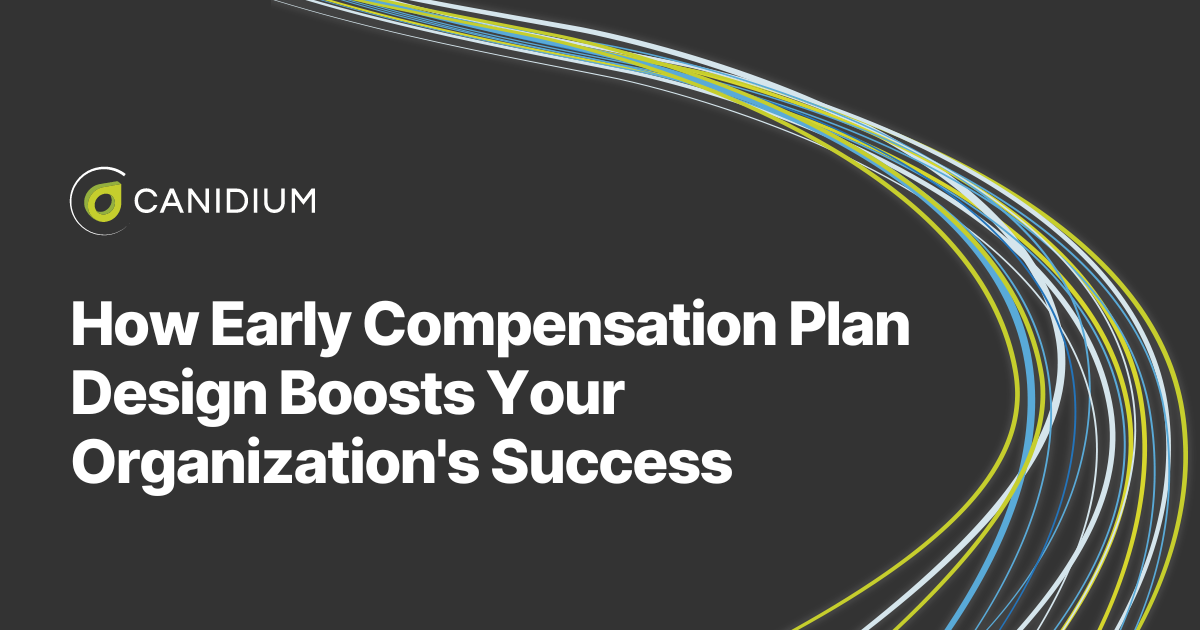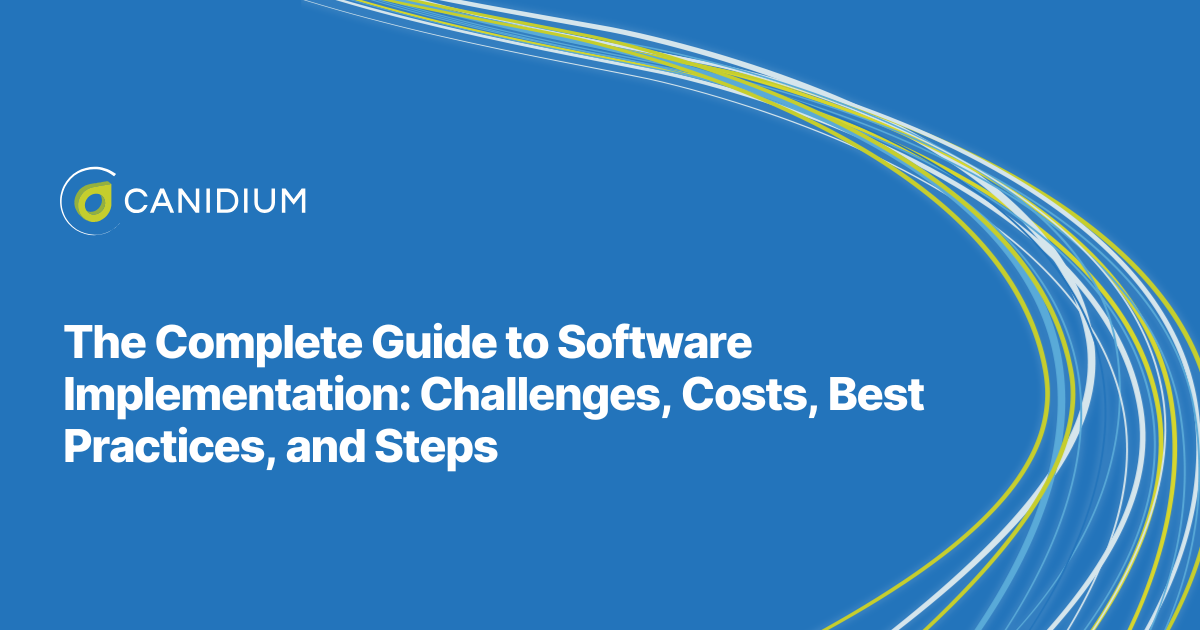Every year sales organizations say the same thing. "We should start our compensation planning process early this year." It rarely happens, though.
Why? There are countless other things to do; emergency projects come up, new business initiatives take our attention - the list goes on.
For this reason, Canidium offers compensation planning process for our clients. We know you have an entire other job to do. We have been doing this since 2008, and we've helped countless clients stay focused on pressing business matters while getting ready with ample time for the following fiscal year.
In this article, we will explore:
- Risks of waiting until the last minute to design compensation plan
- Benefits of starting compensation planning early
The risks of waiting until the last minute
Waiting until the last minute to create compensation plans can lead to several risks and challenges:
Inadequate Budget Allocation
Delaying compensation planning may result in insufficient budget allocation. Without enough time to analyze and forecast financial resources, organizations may struggle to allocate appropriate funds for compensation packages. This can lead to suboptimal or non-competitive offerings, making it challenging to attract and retain talented employees.
Rushed Decision Making
Last-minute planning often leads to rushed decision-making, which increases the likelihood of errors and oversights. Inadequate time for thoughtful analysis and consideration may result in poorly designed compensation structures that fail to align with business goals or employee expectations.
Missed Market Trends
The job market is dynamic, and compensation trends evolve. By delaying compensation planning, organizations risk falling behind in understanding and adapting to market changes. They may also miss out on critical insights regarding salary benchmarks, industry trends, and emerging benefits that could enhance their competitiveness in attracting and retaining top talent.
Difficulty in Employee Buy-In
Effective compensation planning requires input and collaboration from various stakeholders, including employees and management. Delaying the process limits employee engagement, feedback, and involvement opportunities. This can lead to a lack of employee buy-in and reduced satisfaction with compensation packages, potentially resulting in decreased morale and productivity.
Increased Turnover and Attrition
Inadequate or delayed compensation planning can increase employee turnover and attrition rates. Employees who feel undervalued or under-compensated are more likely to seek opportunities elsewhere. Delaying compensation planning exacerbates this risk, as it prolongs the period of dissatisfaction and increases the chances of losing valuable talent.
Compliance and Legal Issues
Compensation planning involves adherence to various legal and regulatory requirements, such as minimum wage laws, equal pay regulations, and tax implications. Last-minute planning leaves limited time for conducting comprehensive compliance reviews, which increases the likelihood of errors, omissions, or non-compliance. This can result in legal issues, penalties, and damage to the organization's reputation.
Implementation Challenges
Developing and implementing a well-structured compensation plan design require time and coordination across multiple departments, including HR, finance, and legal. Last-minute planning may lead to logistical challenges, including rushed communication, delayed policy updates, and inadequate training for managers and employees. This can hinder the smooth implementation of the new compensation plans and create confusion or dissatisfaction among the workforce.
Benefits of starting the compensation planning process early
It is essential to carefully plan compensation for a number of reasons. This includes ensuring that employees are fairly rewarded for their contributions, attracting and retaining top talent, incentivizing high performance, and maintaining internal equity within the organization. Additionally, a well-thought-out compensation plan can help to align employee objectives with organizational goals and contribute to overall employee satisfaction and engagement.
Strategic Alignment
Planning ahead allows organizations to align their compensation strategies with their business objectives. It enables a thoughtful analysis of the company's goals, market conditions, and talent needs. This alignment ensures that compensation plans support and reinforce the organization's strategic direction.
Attracting Top Talent
Compensation is critical in attracting and retaining top talent. Planning ahead enables companies to research industry standards, salary benchmarks, and market trends comprehensively. This knowledge helps organizations offer competitive compensation packages that appeal to high-quality candidates, giving them an edge in talent acquisition.
Budgeting and Resource Allocation
Early planning facilitates accurate budgeting and resource allocation. Organizations can allocate appropriate funds by forecasting compensation expenses in advance, ensuring that compensation plans are adequately funded. This proactive approach helps prevent budgetary constraints and financial surprises.
Retention and Employee Engagement
Well-designed compensation plans contribute to employee satisfaction, motivation, and engagement. Planning ahead allows organizations to develop comprehensive reward systems that effectively recognize and reward employee contributions. This fosters a positive work environment and promotes employee loyalty, reducing turnover rates and retaining top performers.
Compliance and Legal Considerations
Compensation planning involves compliance with various laws and regulations, including minimum wage requirements, equal pay laws, and tax regulations. Planning ahead allows organizations to review and ensure compliance with these legal obligations. It provides ample time for audits, policy updates, and adjustments to avoid legal risks and penalties.
Performance Management and Incentives
Planning ahead enables organizations to integrate performance management systems and incentive structures into their compensation plans. By setting clear performance expectations and aligning rewards with individual and team achievements, companies can motivate employees to perform at their best and drive organizational success.
Effective Communication and Change Management
Early planning allows organizations to communicate compensation changes to employees effectively. Transparent and timely communication ensures employees understand the rationale behind compensation decisions, reducing confusion and fostering trust. Planning ahead also allows change management strategies to be implemented smoothly, minimizing disruption and resistance.
Competitive Advantage
By planning ahead, organizations gain a competitive advantage in the job market. They can adapt quickly to changing market conditions and attract top talent by offering attractive compensation packages. This advantage helps differentiate the organization from competitors and positions it as an employer of choice.
Canidium Can Help
Canidium, with its deep expertise in compensation planning, has been a trusted partner for many clients seeking to optimize their compensation plans. By enlisting Canidium's services, you can benefit in several ways:
- Alleviate the burden on your team, enabling them to dedicate more time and energy to other strategic initiatives.
- Harness the advantages of meticulous and forward-looking planning, leading to more effective and sustainable compensation strategies.
- Elevate your organization by setting new benchmarks and best practices in the realm of compensation planning.
Get started today! Fill out the form below to contact us:








